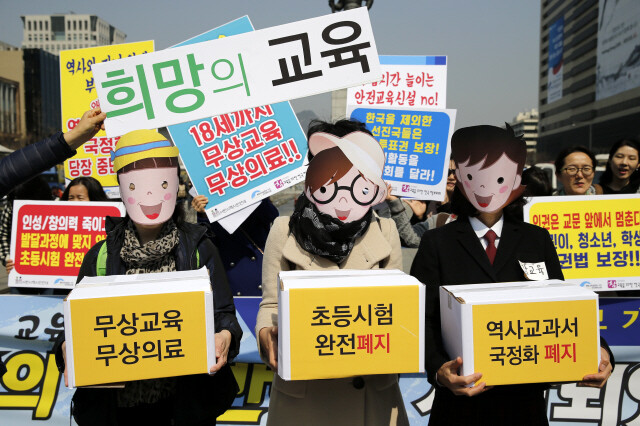hankyoreh
Links to other country sites 다른 나라 사이트 링크
US State Department report highlight state history textbooks as concern

The Park Geun-hye administration’s plan for introducing state-issued history textbooks was singled out as a matter of concern in a US State Department human rights report.
Section 2 on “Respect for Civil Liberties” in the department’s “2015 Human Rights Report” published on Apr. 13 included two new references to South Korea’s middle and high school history textbooks in an item on “Freedom of Speech and Press.”
“In October the Ministry of Education announced plans to require middle and high schools to use only Korean history books authored by the government-affiliated National Institute of Korean History starting in the 2017 school year,” the report noted in a subsection on “Censorship or Content Restrictions.”
“This would end the right of schools, since 2010, to choose from a range of textbooks approved by the ministry,” the report continued.
The textbook issue was mentioned again in another item on “Academic Freedom and Cultural Events” in the section on “Freedom of Speech and Press.”
“There were no government restrictions specifically targeting academic freedom or cultural events. However, a government plan to end middle and high schools’ right to choose Korean history textbook [sic] raised concerns about academic freedom,” the report noted.
South Korea’s National Security Law was also mentioned as a major human rights issue. An executive summary by the State Department observed that “[t]he primary human rights problems reported were government interpretation of the National Security Law, libel laws, and other laws to limit freedom of speech and expression and restrict access to the internet, and the continued jailing of conscientious objectors to military service.”
Other issues cited included “some official corruption, the absence of a comprehensive anti-discrimination law, sexual and domestic violence, child prostitution, and trafficking in persons.” The report made further reference to issues concerning discrimination against North Korean defectors, minorities, AIDS patients, and foreigners, as well as restrictions on association and assembly freedoms and political engagement by public servants and teachers.
In the case of North Korea, the department criticized continued political suppression by the authoritarian regime and the banning or restriction of political opposition.
By Jeon Jeong-yun, staff reporter
Please direct questions or comments to [english@hani.co.kr]

Editorial・opinion
![[Column] Park Geun-hye déjà vu in Yoon Suk-yeol [Column] Park Geun-hye déjà vu in Yoon Suk-yeol](https://flexible.img.hani.co.kr/flexible/normal/500/300/imgdb/original/2024/0424/651713945113788.jpg) [Column] Park Geun-hye déjà vu in Yoon Suk-yeol
[Column] Park Geun-hye déjà vu in Yoon Suk-yeol![[Editorial] New weight of N. Korea’s nuclear threats makes dialogue all the more urgent [Editorial] New weight of N. Korea’s nuclear threats makes dialogue all the more urgent](https://flexible.img.hani.co.kr/flexible/normal/500/300/imgdb/original/2024/0424/7317139454662664.jpg) [Editorial] New weight of N. Korea’s nuclear threats makes dialogue all the more urgent
[Editorial] New weight of N. Korea’s nuclear threats makes dialogue all the more urgent- [Guest essay] The real reason Korea’s new right wants to dub Rhee a founding father
- [Column] ‘Choson’: Is it time we start referring to N. Korea in its own terms?
- [Editorial] Japan’s rewriting of history with Korea has gone too far
- [Column] The president’s questionable capacity for dialogue
- [Column] Are chaebol firms just pizza pies for families to divvy up as they please?
- [Column] Has Korea, too, crossed the Rubicon on China?
- [Correspondent’s column] In Japan’s alliance with US, echoes of its past alliances with UK
- [Editorial] Does Yoon think the Korean public is wrong?
Most viewed articles
- 1‘We must say no’: Seoul defense chief on Korean, USFK involvement in hypothetical Taiwan crisis
- 2N. Korean delegation’s trip to Iran shows how Pyongyang is leveraging ties with Moscow
- 3‘Weddingflation’ breaks the bank for Korean couples-to-be
- 4Will NewJeans end up collateral damage in internal feud at K-pop juggernaut Hybe?
- 546% of cases of violence against women in Korea perpetrated by intimate partner, study finds
- 6[Column] Park Geun-hye déjà vu in Yoon Suk-yeol
- 7“Parental care contracts” increasingly common in South Korea
- 8[Column] Yoon’s first 100 days should open our eyes to pitfalls of presidential system
- 9[Interview] Dear Korean men, It’s OK to admit you’re not always strong
- 10[Editorial] New weight of N. Korea’s nuclear threats makes dialogue all the more urgent